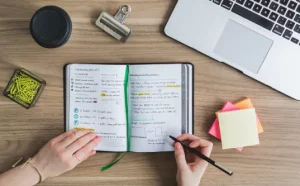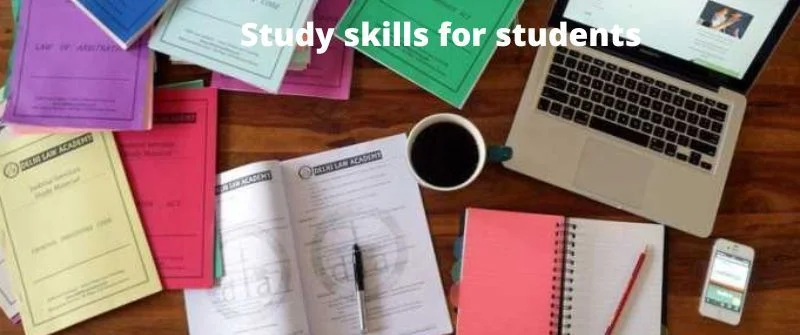When dealing with school assessments, it is advisable to organize and plan how to study. Whether you are in elementary, high school, or college level, you have to apply study skills when learning.
These are academic strategies that help a student in the various fields of study. Essentially, study skills can help you not only retain but also recall information after studying.
9 Study Skills for All Students
1. Take notes
It is difficult to capture everything that your tutor explains when a class is in session. Therefore, the best approach is to write down the important points.
If you are unable to capture all the points, you can check with your classmates to confirm if you missed a concept. You can also add more points to your notes later after making a comparison with your classmate’s notes.
Note-taking should be done effectively by paying attention to every detail. Boldface words and all headings should be clear. You can later rework on the ideas you have captured and make them easy to understand when you are studying.
2. Time Management
As a student, you can have other life responsibilities to do apart from studies. Running errands, going to work, and attending classes can be quite a challenge.
This can overwhelm you if you do not plan your time properly. Good time management skills are what you need to be more productive and successful at any level of education.
To manage your time well during your studies, always plan early. This helps to avoid a last-minute rush when submitting assignments or attending to personal duties.
You will save time and energy with proper time planning. Try to prioritize the tasks at hand by deciding the important topics to tackle first. If you have difficult tasks, split them into small portions which will be easy to manage.
3. Make use of the Syllabus
Your syllabus plays a critical role when you want to cover all the topics in your class. When you have time, you can use the syllabus to know the topics that you can cover for a particular day.
The syllabus is the best guide to ensure that you cover all the major topics effectively.
4. Have Goals
Just like in any other aspect of life, studies also need goals. Goals are good because they can challenge and propel you to finish academic tasks on time.
With clear goals in mind, there will be adequate motivation to help you get ahead. Simply set a goal of what you want to accomplish within a specific period. With goals, you won’t be questioning the existence of homework.
However, ensure that you set goals that are attainable and reasonable. Having goals that are unrealistic and too high to attain can lead to disappointment.
5. Collaborate with Classmates

Teaming up with classmates is a good study skill for students. Working together kills boredom and is a fun way of studying.
You can get more ideas if you opt to work with your classmates. Above all, you can also tackle difficult topics easily when you work in a group.
When you are studying in a group, you can borrow ideas that will help you handle concepts that you are struggling to understand.
However, ensure that the study sessions you have with classmates do not go off track or take a lot of your time.
Even more importantly, group yourself with like-minded classmates who can help you and not be a source of distraction.
6. Teach others
When you are good at concepts or particular topics, you can be a better master if you teach others. In this way, you end up getting a deep understanding of new ideas.
Endeavor to teach other students who have challenges in concepts that you are good at. Through teaching, you will surely understand the materials in a better way.
In the process of teaching, you can identify problems you were not aware of in a concept.
7. Review your Notes
Notes are very important in your studies. However, it is advisable to review them frequently so that you master important points.
Do not wait until the last minute when you are about to sit for a test. Revise your notes as frequently as possible when the concepts or lectures are still fresh.
Frequent reviewing will enable you to notice missing pieces of information and add them. Also, it gives you time to make a comparison with your classmate’s notes which is beneficial in your studies.
Reviewing notes is one of the best ways of reinforcing your learning.
8. Have Organizing Skills
When you organize your work, you will be able to save valuable time. Ensure all your study materials are in order and everything is in its appropriate space.
Books, laptops, calculators, and notebooks are some of the important materials that should always be available. When these materials are in one convenient location, you will always be ready to study.
9. Read to Yourself what you Study
Reading to yourself out loud is an important study approach that can help you to memorize important points. If it is difficult to remember ideas, reading out loud can help you.
Some students find it easy to memorize concepts through the use of sound. The better approach is to read the materials in your course loudly.
Another sound alternative is to record yourself when you are studying privately. You can then take these recordings and listen when you are in a car or public transport.
Listening to materials several times will enable you to understand and memorize important points.
Study Skills for Higher Education Students
For higher education students, this is an important stage that needs soberness and sheer commitment. Follow your syllabus strictly so that you can cover all the important topics in your course.

Do not postpone difficult subjects but tackle them first. Getting the difficult concepts simplified will help you to reduce procrastination.
Break your work into short blocks and always ensure you have breaks in your studies.
Long study sessions are not good because you can easily lose focus and concentration.
If you want to break through materials easily, split your work into smaller sessions.
Take your mind and eyes off from studies by having short breaks for refreshing.
Study Skills for High School Students
High school is a very critical stage in a student’s academic calendar. This is the time you need to complete all assignments because they all have a purpose in your studies.
Plan your time well, especially during holidays and weekends. This will enable you to finish assignments and also have time for other family activities.
In high school, avoid skipping classes as much as possible. Even if there are important functions to attend, skipping classes should not be a habit. Being in class regularly makes it easy to keep up with classwork.
Study Skills for Kids in Elementary School
Elementary school is one of the crucial foundations of a student’s academic journey. Proper studying usually starts in class and this stage needs a child to pay attention to the teacher.

If there is any problem that hinders your concentration, ensure you consult your teacher or parent.
If you do not understand the study material, you can ask your teacher for help so that you eliminate any form of confusion.
Kids in elementary school need to have adequate sleep. Let the brain rest so that you have a concentration in class the following day.
Homework and assignments can be broken down into smaller chunks so that you finish them in time.
Study Skills when Revising for Multiple Choice Exams
Multiple-choice exams need preparation strategies that are different from essay exams. A student has to identify the correct answer from a set of 3-5 options. Below are helpful study skills for this type of exam:
- Ensure you reread and rewrite all the important notes. This will help you to refresh the concepts and materials in your head. You can slowly read the notes to yourself loudly as an act of memorizing.
- Put the notes down in a manner that you can understand easily. Use outlines, idea maps, and charts as a way of categorizing information. In this way, you can easily memorize all the links to the study material.
- Start your studies early enough so that you can retain all details effectively. It is possible to build a lasting memory if you study bit by bit each day.
- As you study, memorize all the important concepts and terms that your teacher was emphasizing in class. Most of the repeated events or features in the study materials are likely to be in the multiple-choice exams.
- Form a habit of making lists and tables when going through your class notes. Also, familiarize yourself with the multiple-choice process so that you know what differentiates the choices.
- Form a study group that will help you to brainstorm most of the common multiple-choice questions in a particular subject. Other students studying the same course can give you new ideas for tackling this type of question.
Study Skills to Revise for Written Tests
When preparing to take a written exam, study smarter and not longer. Go through all the notes and memorize the important ones. It is easier to cover every topic if you have a schedule.
When studying, do away with all distractions so that you can concentrate fully. It is equally important to have a good location for studying. This should be a quiet place where you can concentrate without distractions.
An outline can help you to cover all concepts so that you do not leave out any ideas. Prepare a framework that has the topics and concepts that are likely to be featured in the exams.
In this way, you can easily memorize all the vital facts or information that will be in the exams.
Even more importantly, consult your teacher to get secrets and suggestions on the areas the exam is likely to test students. This is a study skill that will enable you to cover all subjects and topics that will be tested in the exam.
.

Joseph is a freelance journalist and a part-time writer with a particular interest in the gig economy. He writes about schooling, college life, and changing trends in education. When not writing, Joseph is hiking or playing chess.
